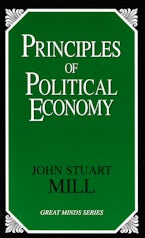
Principles of Political Economy
Published by: Globe Pequot
Series: Great Minds Series
896 Pages, 5.50 x 8.50 x 0.50 in
Other Retailers:

Published by: Globe Pequot
Series: Great Minds Series
896 Pages, 5.50 x 8.50 x 0.50 in
Other Retailers: